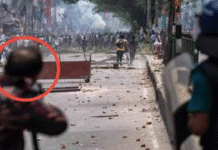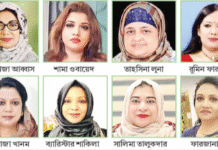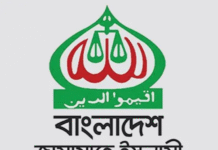

There is no scope for repealing the sanctions against Rab, without concrete actions and accountability, United States Ambassador to Bangladesh Peter Haas said today.
He was speaking at a seminar organised at Bangladesh Institute of International and Strategic Studies on US-Bangladesh relations.
“We want to see a Rab which is capable of combatting terrorism but which is also capable of respecting basic human rights,” said Haas.
Just prior to his remark Rab Director-General Chowdhury Abdullah Al-Mamun spoke about how Rab had established an internal inquiry cell to ensure accountability of Rab personnel in 2011, with US cooperation.
He said that under the International Criminal Investigative Training Assistance Program, a total of 147 Rab personnel have been trained on basic interviewing skills and human rights.
“The trained personnel have been distributed across Rab to ensure transparency and uphold human rights credentials,” said the Rab DG.
Foreign Minister AK Abdul Momen, also present at the event, commented that it was the former US Ambassador James F Moriarty who had called Rab the FBI (Federal Bureau of Investigation) of Bangladesh.
“Rab has since then done an excellent job at combatting terrorism. Maybe we have to look at it more closely to see how to increase accountability…but this is a great institution,” said Momen.
“Let us have a road – you tell me where the gap is and we will try to work with you,” he said.
Peter Haas also said that the Rab sanctions do not mean that US and Bangladesh will not continue strong law enforcement security cooperations.
“We will continue to work with Bangladesh to combat violent terrorism, combat transnational crime and enhance security. We will continue our support to the transnational crime police and to the anti-terrorism unit and the specialised police units in Chattogram, Sylhet and Rajshahi. The signing of a proposed memorandum of agreement would facilitate our assistance training program and to donate new equipment to the police,” said Haas.
He also said, “USA is not perfect. We have embarked on our own democratic renewal. This journey ensures tackling our own issues with police accountability. We are inviting other countries in the world to make similar commitments.”
The ambassador also announced that the US will remain impartial observers in the upcoming parliamentary elections. “The USA will not pick a side in the elections – our view is simple, that the Bangladeshi people have a democratic process that allows them to choose their government.”
“Holding an election consistent with international standards is not just about ballot day – truly fair elections involve creating a space where civic discourse can take place, where journalists can investigate without fear, and the ability of the civil society institutions to advocate. In Bangladesh the elections have already started,” said Haas. He welcomed the law minister’s commitment to reform the DSA to prevent abuse of the law.
Momen responded to Haas’ comment about holding impartial elections by saying, “You are most welcome to come with your observers. We want to see and improve.”
The US ambassador also spoke about the need for signing two defence treaties called ACSA and GSOMIA that are foundational agreements for defence trade and cooperation.
He called the treaties “building blocks”. GSOMIA would set the ground rule for exchanging sensitive data about military operations, said Haas, while ACSA will allow exchange of fuel and food.
He said that they are not like the “broad vague defence agreement that Bangladesh signed with China in 2002”, referring to the “China-Bangladesh Defence Cooperation Agreement” which covers military training and defence production.
Haas also said that Bangladesh is not being able to capitalise on US relations because of labour rights violations.
“The DFC (U.S. International Development Finance Corporation) has a $4 billion active portfolio in South Asia across multiple sectors including clean energy, healthcare, agriculture. The DFC cannot operate in Bangladesh because of a lack of labour rights,” he said.
He added that the embassy will include the first full-time attache from the US department of commerce this summer, to increase two-way trade and investment.
Former ambassador Kazi Imtiaz Hossain, chairman of BIISS, led the event, while former ambassadors Humayun Kabir, Tariq A. Karim, former election commissioner Brig Gen (retd) Dr M Sakhawat Hossain, director-general of BIIS Maj Gen Mohammad Masudur Rahman and Dhaka University professor Ruksana Kibria also spoke at the event.









